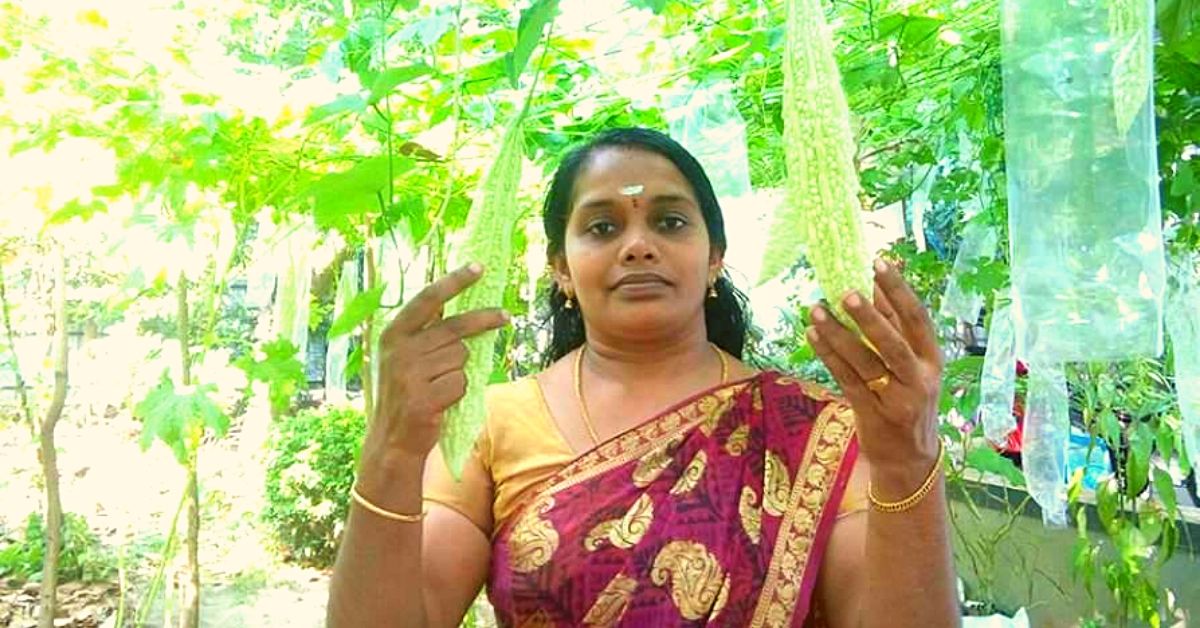Turning hard work into smart work, Vijaya Kala, a part-time farmer and a full-time tax-auditor is increasing her food output without toiling under the sun for hours or hopelessly waiting for the rains.
Vijaya is a resident of Kerala’s Karunagappally town, who six years ago, opted for farming techniques which were less-labour intensive and more efficient, including polyhouse and Precision Agriculture (PA) and started growing plants and vegetables.
Want to begin gardening but don’t know how to start? Check out these cost-effective garden accessories here.

Speaking to The Better India about the benefits of her farming techniques, the 39-year-old says,
“PA is site-specific farming, which means that crops and veggies are grown based on weather patterns, humidity and soil temperature. Instead of using one single approach for all the vegetables, each plant is treated differently. As for the polyhouse, veggies are grown under controlled climatic conditions, and thus, there are fewer chances of crop damage. Plus, food can be grown in a polytunnel around the year. It also keeps the insects and pests at bay.”
Vijaya’s motivation to grow organic vegetables in her backyard was neither a life-changing experience nor a childhood passion that was reignited.
It was in fact, a discussion among friends about growing food at home that pushed her to go online and research about the topic. In no time, the research turned to a full-fledged plan that she presented to the state’s Agriculture Department to avail farming subsidies.
With no farming land of her own, she installed two polytunnels comprising 100 square metres, one on her terrace and the other one in the house’s backyard at an investment cost of 1.20 lakh (50,000 of which was from the government subsidy.) Additionally,she also has an acre of land (taken on lease) to extend vegetable farming through PA .
From veggies like tomatoes, capsicum, radish, onion, spinach, bitter gourd, cabbage, beans to flowers like orchid and marigold, all the food is grown organically. She prepares her own agri inputs like fertiliser which is a mixture of cow dung, urine and water.
As for the polyhouse process, Kala makes a bed comprising cow dung and neem cake (residue obtained from neem seed kernels). The bed is covered with mulching sheet drilled with holes where the seeds are planted.
Water is supplied through a drip irrigation system through pipes. “In drip irrigation, water is directly provided to the roots. It minimises evaporation, thus retaining the moisture and reducing the volume of water given to each plant,” says Kala.
In the beginning, she faced crop losses and damages, but with time, the plants got used to her home-made fertiliser.
On average, Kala’s farm produces veggies, every two months. She sells the produce in the market earns a monthly profit of around Rs 20,000.
“I sell them on a rotational basis. For example, if half of the vegetables are sold in June, the other half are sold in July. I also grow and sell vegetable saplings—in fact, recently I sold 500 red papaya saplings in my neighbourhood,” she exclaims!
With an aim to spread her knowledge and expertise with citizens who are keen on growing or developing a farm in their backyard, Kala holds interactions on her social media platform.
Though she attends to the farm after 5 pm on weekdays and gets a chance to dedicate more time only on weekends, she takes it very seriously.
“It is tough dividing my time between job, family and farm, but farming is something I have become passionate about. It is not an extracurricular activity, but a part of my daily routine now. I wish to continue it for as long as I can,” says Kala.
All the images are sourced from Vijaya Kala.
You can reach out to Vijaya Kala here.
Also Read: 28 Years, 10,000 Episodes & One Voice: Meet AIR Kerala’s ‘Radio Agriculturalist’!
(Edited by Gayatri Mishra)
Like this story? Or have something to share?
Write to us: contact@thebetterindia.com
Connect with us on Facebook and Twitter.
If you found our stories insightful, informative, or even just enjoyable, we invite you to consider making a voluntary payment to support the work we do at The Better India. Your contribution helps us continue producing quality content that educates, inspires, and drives positive change.
Choose one of the payment options below for your contribution-
By paying for the stories you value, you directly contribute to sustaining our efforts focused on making a difference in the world. Together, let's ensure that impactful stories continue to be told and shared, enriching lives and communities alike.
Thank you for your support. Here are some frequently asked questions you might find helpful to know why you are contributing?
